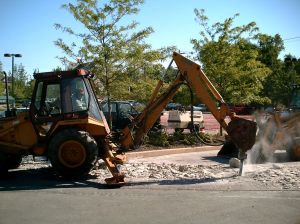According to a recent news article from the Boston Globe, a Shrewsbury man died when he was involved in a crash involving his vehicle and a backhoe. The 79-year-old victim was taken to UMass Memorial Medical Center, where doctors pronounced him dead from his injuries.
 The driver of the backhoe was also treated on the scene by first responders and transported to a local hospital where doctors say his condition is not life threatening. Westborough Police are not yet sure as to the cause of the accident, and an investigation is still ongoing. It has not been established if backhoe driver was in any way negligently responsible for this tragic accident.
The driver of the backhoe was also treated on the scene by first responders and transported to a local hospital where doctors say his condition is not life threatening. Westborough Police are not yet sure as to the cause of the accident, and an investigation is still ongoing. It has not been established if backhoe driver was in any way negligently responsible for this tragic accident.
As our Boston car accident lawyers can explain, accidents involving construction equipment or other heavy machinery typically involve more than one defendant once it is determined who was at-fault.
The first reason for this is because the driver of the construction equipment may be responsible, but his or her employer may also be liable. There are various claims that can be made in some cases. A claim for negligence can normally be made directly against at-fault driver. However, direct claims may also be appropriate against at-fault driver’s employer in certain cases. For example, employer may be liable for negligently training, supervising or retaining employee who caused the accident.
Negligent retention involves a situation where employer knew or had reason to know employee was likely to cause an accident in which a foreseeable victim could be injured. If a particular employee has been involved in a number of previous accidents, or had a drinking problem, for example, it would be negligent to allow him or her to remain on the job driving construction equipment.
Negligent training or supervision, as the terms imply, involve situations where employee was not properly trained to operate a piece of construction equipment and allowed to go out on the job without further training or additional supervision.
In addition to these direct claims, it may be possible to bring a claim under what is known to car accident lawyers as a respondeat superior claim. This means an employer is “vicariously” liable for any negligence on behalf of his or her employees as long as they employee was engaged in activity designed to benefit his employer.
Basically, if a backhoe driver is out using the vehicle for his job, he is doing it to benefit his employer. One defense to this is to argue employee was on a frolic and detour. An example of this would be if the driver took the backhoe off the job site without permission of his employer and drove to the store to buy a lottery ticket. In this case, employer would argue it should not be liable for employee’s conduct because he or she was acting on his or her own and not in furtherance of employer’s goals.
The reason for making various claims against employer is because at-fault driver likely does not have sufficient assets to pay all damages caused by a serious car accident due to his or her negligence.
Boston Car Accident Lawyer Jeffrey S. Glassman offers free and confidential consultations to discuss the rights of victims and their families. Call us today at 877-617-5333 to schedule a free and confidential appointment to discuss your case.
More Blog Entries:
Tunnel Accident in Boston Traps Father & Daughter, Boston Car Accident Lawyer Blog, June 19, 2012
 Boston Car Accident Lawyer Blog
Boston Car Accident Lawyer Blog

